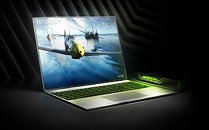Raevenlord
News Editor
- Joined
- Aug 12, 2016
- Messages
- 3,755 (1.15/day)
- Location
- Portugal
| System Name | The Ryzening |
|---|---|
| Processor | AMD Ryzen 9 5900X |
| Motherboard | MSI X570 MAG TOMAHAWK |
| Cooling | Lian Li Galahad 360mm AIO |
| Memory | 32 GB G.Skill Trident Z F4-3733 (4x 8 GB) |
| Video Card(s) | Gigabyte RTX 3070 Ti |
| Storage | Boot: Transcend MTE220S 2TB, Kintson A2000 1TB, Seagate Firewolf Pro 14 TB |
| Display(s) | Acer Nitro VG270UP (1440p 144 Hz IPS) |
| Case | Lian Li O11DX Dynamic White |
| Audio Device(s) | iFi Audio Zen DAC |
| Power Supply | Seasonic Focus+ 750 W |
| Mouse | Cooler Master Masterkeys Lite L |
| Keyboard | Cooler Master Masterkeys Lite L |
| Software | Windows 10 x64 |
NVIDIA is in the process of rolling out the first implementations of its RTX 2000 series GPUs in mobile form, and if the going is as is being reported, it's going to be a little rough for users to actually extrapolate their performance from product to product. This is because manufacturers are apparently getting a whole lot of leeway in how to clock their products, according to their solution's thermal characteristics and design philosophy.
What this means is that NVIDIA's RTX 2080 Max-Q, for example, can be clocked as low as 735 MHz, which is a more than 50% downclock from its desktop counterpart (1,515 MHz). The non-Max-Q implementation of NVIDIA's RTX 2080, for now, seems to be clocked at around 1,380 MHz, which is still a close to 200 Mhz downclock. Of course, these lowered clocks are absolutely normal - and necessary - for these products, particularly on a huge chip such as the one powering the RTX 2080. The problem arises when manufacturers don't disclose clockspeeds of the GPU in their particular implementation - a user might buy, say, an MSI laptop and an ASUS one with the exact same apparent configuration, but GPUs operating at very different clockspeeds, with very different levels of performance. Users should do their due research when it comes to the point of choosing what mobile solution sporting one of these NVIDIA GPUs they should choose.




View at TechPowerUp Main Site
What this means is that NVIDIA's RTX 2080 Max-Q, for example, can be clocked as low as 735 MHz, which is a more than 50% downclock from its desktop counterpart (1,515 MHz). The non-Max-Q implementation of NVIDIA's RTX 2080, for now, seems to be clocked at around 1,380 MHz, which is still a close to 200 Mhz downclock. Of course, these lowered clocks are absolutely normal - and necessary - for these products, particularly on a huge chip such as the one powering the RTX 2080. The problem arises when manufacturers don't disclose clockspeeds of the GPU in their particular implementation - a user might buy, say, an MSI laptop and an ASUS one with the exact same apparent configuration, but GPUs operating at very different clockspeeds, with very different levels of performance. Users should do their due research when it comes to the point of choosing what mobile solution sporting one of these NVIDIA GPUs they should choose.




View at TechPowerUp Main Site







